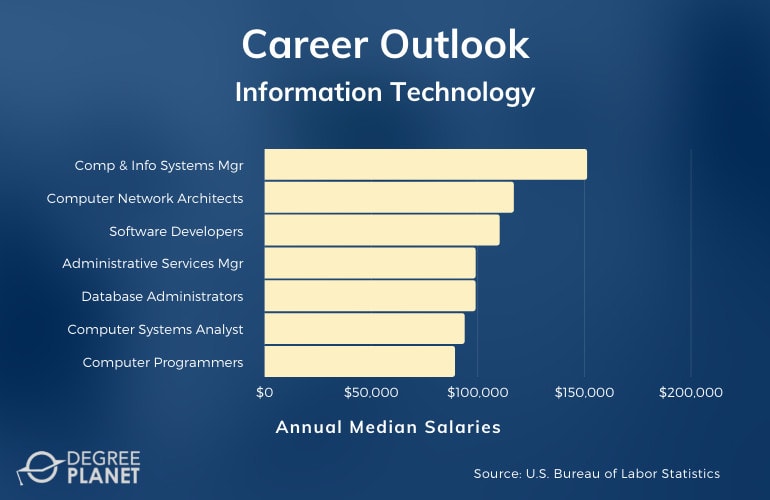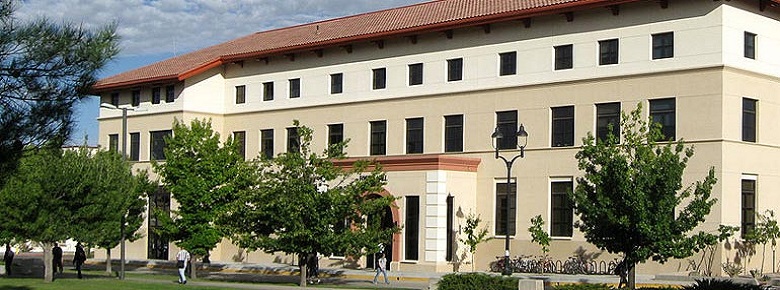Careers in computers and technology are some of the fastest-growing careers in the nation, which means earning an online information technology degree could potentially be a very lucrative decision.

Editorial Listing ShortCode:
There are plenty of online programs out there, and with the potential of financial aid to help you, now may be a great time to enroll.
Online Information Technology Degree Programs
Select the program that most interests you to jump to that section of the guide:
- Information Technology (no specialty)
- Computer Programming
- Computer Science
- Computer Forensics
- Cyber Security
- Data Analytics
- Database Management
- Game Development & Design
- Information Systems Management
- Information Systems Security
- Mobile Application Development
- Network Administration
- Software Engineering Management
- Web Development
Although there may be some crossover between these careers, there are some important distinctions to consider.
Information Technology

If you’ve ever called tech support, you are probably familiar with what IT specialists do. If you’re interested in becoming an IT technician or specialist, a general degree in information technology may be a good choice.
This degree can help you obtain comprehensive knowledge of information technology and equip yourself with the skills needed to install computers, set up and maintain networks, and administer updates to systems as needed.
Editorial Listing ShortCode:
These skills can also help you troubleshoot and fix computers, networks, and systems. Potential careers after earning your bachelor’s in information technology include computer and information systems manager, database administrator, network and computer systems administrator, computer systems analyst, and other IT-related jobs.
Computer Programming

If your interests lie less in fixing and maintaining computers and more in writing and designing the code that makes them and their programs work properly, you might instead choose to focus on computer programming.
Programming often requires someone with a meticulous nature who can keep track of tiny details and find the most hard-to-catch flaws in a system.
Editorial Listing ShortCode:
A computer programming curriculum can help you learn about the different programming languages (Java, C++, and others) and how to use them to create operating systems, computer software, and other computer programs.
Potential jobs include computer programmer, software developer, software engineer, web developer, systems analyst, database developer, and other similar careers.
Computer Science

A computer science degree is an all-encompassing, broad overview of all things computer- and technology-related. It’s the degree that covers the topics under the umbrella of “computers and technology,” such as computer programming, information systems, cyber security, analytics, and information systems management.
Editorial Listing ShortCode:
If you don’t have a particular specialty you’re interested in and instead want to know everything related to computer science, this may be the choice you should make. This degree can also help open the door to diverse career opportunities because it covers such a variety of topics.
At the bachelor’s level, people with this degree often become software developers, software testers, software engineers, and network architects.
Computer Forensics

Computer forensics is a fairly specific specialty when it comes to tech degrees. At its core, computer forensics is used for gathering information to be used in a court of law.
Like forensics experts, who comb through crime scene evidence to help detectives solve crimes and arrest and convict criminals, computer forensics experts help in a similar way, only they search through evidence online and inside computer systems.
Editorial Listing ShortCode:
Computer forensics experts examine the computers, tablets, laptops, cell phones, and other digital devices of people suspected of committing crimes. This evidence, such as threatening messages, location settings, bank records, and inappropriate videos/images, can then be used in trials to convict criminals.
Cyber Security

Much like computer forensics, cyber security is another particularly specialized field of computer science. If you are interested in guarding against malicious attacks on the computer systems of individuals, companies, and/or the government, a degree in cyber security may be right for you.
Cyber security experts protect computers, networks, programs, and systems from digital attacks known as cybercrime. Most often, these types of attacks aim to access sensitive information stored on computers or in the cloud. The attackers then change, destroy, or use this information to blackmail, extort, threaten, rob, or steal the identity of users.
Editorial Listing ShortCode:
Cyber security experts guard against that, use ethical hacking to counter it, and design protections to prevent cybercrime from happening in the first place.
Data Analytics

If you enjoy researching and sifting through copious amounts of data and then using that data to make predictions about upcoming trends in order to help maximize the efficiency of businesses and companies, data analytics might just be perfect for you. Having a good head for math and numbers will be helpful as well since it will likely be a large part of your curriculum.
Editorial Listing ShortCode:
Most data analytics degree programs cover linear algebra, analytics programming, time series analysis and forecasting, data mining, and statistical analysis.
You could potentially become a data scientist, market research analyst, mathematician, statistician, database administrator, or computer and information research scientist with this degree.
Database Management

Simply put, adequate database management helps counteract the negative consequences of overcrowded database systems. Effective database management can help you to proactively implement numerous techniques that decrease these negative consequences, such as slow-down, lag-time, errors, and system breaches.
Editorial Listing ShortCode:
In some ways, a career in database management is similar to a career in cyber security. Those in database management protect the data of the companies they work for. They are constantly working to improve their companies’ systems to keep them running at their best and are responsible for creating stable backup systems.
It is also their job to keep companies in compliance with any legal issues concerning the storage of people’s private information.
Game Development & Design

If you’ve ever said to someone, “My dream job is one where I get paid to play video games all day,” then a degree and subsequent career in game development and design might just be for you.
Editorial Listing ShortCode:
This degree program often includes classes such as:
- Introduction to Game Theory
- Writing for Video Games
- Game Design Programming
- Introduction to Graphic Design
- Interactive Entertainment
- Computing for Creative Purposes
The ultimate goal for most people in this program is to become video game designers, but there are other potential jobs in this field. Those with this degree often become graphic designers, animators, multimedia artists, art directors, software developers, and web developers.
Information Systems Management

If you care more about putting existing technology into use rather than creating new technology yourself, you may want to major in information systems management. Students in this field typically focus more on how to use technology in the most innovative and helpful ways for businesses.
Editorial Listing ShortCode:
To be successful in this field, it can be useful to be someone who loves experimenting with new technology and who doesn’t mind explaining to other people how things work.
Course topics for this degree will likely focus on making the most of the internet, debugging programs, managing large-scale computer projects, and making databases perform at maximum performance. Jobs that can be pursued with this degree include those in IT tech support, IT consulting, IT management, and application analysis.
Information Systems Security

This degree is very similar to a degree in cyber security. The difference between the two is what, specifically, you’ll be protecting if you get jobs in each field. In short, cyber security is about protecting whole systems and networks from malicious attacks and cybercrime.
Information systems security is a little more focused. As opposed to entire systems and networks, information systems security focuses on protecting the actual data people store on their computers. It’s about keeping confidential information secure.
Editorial Listing ShortCode:
Information systems security is also a little more internal than external. Cyber security protects from outside attacks. Information systems security does this to a certain extent as well, but it also protects against the misuse of information from within organizations.
Mobile Application Development

The work involved in the field of mobile application development is pretty much right there in the name. If you’re interested in coding, programming, and developing apps for mobile devices, this may be a great degree for you.
These could be useful apps (e.g. the clock and calendar apps on your phone), social apps (e.g. Facebook and Twitter), or entertainment apps (e.g. game apps).
Editorial Listing ShortCode:
Degree programs for mobile application development often include classes such as:
- Introduction to Programming
- Introduction to Digital Devices
- Fundamentals of Information Technology and Networking I & II
- Introduction to Artificial Intelligence and Machine Learning
Popular careers pursued with this degree include mobile app developer, software developer, and game tester.
Network Administration

Network administrators ensure that companies have solid networks where everything—security, programs, computers, wi-fi networks, etc.— runs properly. It is also their responsibility to keep the networks updated, secure, and operating at optimal performance.
Editorial Listing ShortCode:
Common topics studied in this degree program are networking principles, operating systems, computer programming, web development, IT troubleshooting, database operations, and project management.
In addition to becoming a network administrator, other potential jobs include systems analyst, network/systems architect, database administrator, and information security analyst.
Software Engineering Management

For software engineering, you’ll likely be taking many of the same courses as someone majoring in computer programming. That’s because many of the basic functions and necessary skills for success are the same. This is another degree that often requires people to be highly analytical and extremely detail-oriented in order to excel.
Just like a computer programming curriculum, software engineering programs typically cover a variety of coding languages.
The difference between the two degrees is that for a software engineering program, you’ll likely be required to take a lot more courses in electrical and software engineering, software requirements specification, software testing, and other similar topics.
Editorial Listing ShortCode:
In addition to becoming a software engineer, you might also become an application, game, or web developer or something similar with this degree.
Web Development

If your interests lie in web development, website design, web page creation, or something in that realm, a specialty degree in web development may be an excellent choice. Those who do well in this field typically have a balanced mixture of analytical skills and creativity.
Editorial Listing ShortCode:
Web development programs typically provide a nice, well-rounded computer science education by covering aspects of computer programming, web development, graphic design, information systems, data analysis, and other popular computer science fields.
In addition to becoming a front-end, back-end, or full-stack web developer, you could also potentially get a job in graphic design, social media marketing, software design, and a similar field.
Online IT Degree Curriculum & Courses

Your classes will vary depending on which particular specialization you take, but here are ten of the most popular classes you’ll likely have to take in an information technology degree program, no matter your specialization.
Programming Fundamentals: This class covers basic programming languages, techniques, and troubleshooting. It can help you develop the fundamental skills needed for programming.
Operating Systems Fundamentals: This is an introductory course about operating systems, their functions, and the similarities and differences between them.
IT Theory Fundamentals: This is an introductory class that covers the basics of IT, with a specific focus on applying IT principles to real-world tech problems.
Web Developing: This course provides an overview of front-end, back-end, and full-stack web development, web applications, and social media marketing.
Cyber Security Fundamentals: This class can help you gain an understanding of basic cyber security principles.
Editorial Listing ShortCode:
Network Security: This is a more advanced cyber security class with a particular emphasis on the security of large networks.
Database Administration Fundamentals: This course is an overview of all the tasks accomplished in database administration.
Statistical Concepts: This course can help you learn about statistics, particularly how they relate to the quality of software and operating systems.
Fault-Tolerant Systems: In this course, students can learn how to design their own fail-safes and backup systems in case of breaches or computer crashes.
IT Project Management: This is an intermediate IT course that covers the techniques, tools, and knowledge needed to successfully manage IT projects from start to finish.
All of these classes may be required for any of the specialties we’ve mentioned.
Information Technology Careers & Salaries

Because computer and tech-related fields are usually popular and in demand, the average yearly salaries for them are typically quite good.
For those with a bachelor’s degree in information technology, the average salaries for many jobs in the field start somewhere around $77,000 and move steadily upwards from there. According to the Bureau of Labor Statistics, here are ten of the highest-paying jobs in the field:
| Careers | Annual Median Salaries |
| Computer and Information Systems Managers | $151,150 |
| Computer Network Architects | $116,780 |
| Software Developers, Quality Assurance Analysts, and Testers | $110,140 |
| Administrative Services and Facilities Managers | $98,890 |
| Database Administrators and Architects | $98,860 |
| Computer Systems Analysts | $93,730 |
| Computer Programmers | $89,190 |
| Network and Computer Systems Administrators | $84,810 |
| Web Developers and Digital Designers | $77,200 |
| Forensic Science Technicians | $60,590 |
As you can see, these bachelor-level jobs typically pay decent salaries. Computers and technology are booming fields right now, and their projected growths aren’t expected to slow down anytime soon.
If you earn your bachelor’s in this particular field, odds are good that you’ll be able to find a job without much trouble. Odds are also good that the job will pay well.
Editorial Listing ShortCode:
Most of the jobs listed here can be pursued with a bachelor’s in information technology alone. If you earn a specialty degree, such as in cyber security or video game design, your salary could potentially be even higher.
Online IT Degree Admissions Requirements

Each college will have its own specific admissions requirements for acceptance into its IT program, but there are a few admissions requirements that are common at most colleges.
- GPA: Most colleges require, at minimum, a 2.0 unweighted GPA to get into their IT programs. Some colleges with more competitive programs may require a 3.0 or higher for acceptance.
- Standardized test scores: Several colleges have moved away from requiring specific standardized test scores for entrance into their IT programs, but most will still require you to submit your scores so they know where you stand academically.
- Work experience: IT program applications may inquire about your work experience for two reasons. 1. The programs are advanced and very competitive and having relevant work experience can put you ahead of applicants without experience. 2. Many colleges reward college credit for relevant work experience, meaning you could potentially take fewer classes to finish your degree.
- Personal statement: Most colleges will ask you for a personal statement that tells them a little bit about you. They may want to know why you want to enroll in the program, your academic experience, whether you have any relevant work history, and what you hope to achieve after earning your degree.
Some schools may not require all these things, while other schools may require more. You can check a college’s website, usually under the admissions tab, to see the specific admissions requirements you’ll be required to meet for acceptance.
Accreditation for Online IT Degrees

Before you check out the admissions requirements and start sending in applications, transcripts, and other documents, it is important to check out the college’s accreditation status. This should be listed on the school’s website.
If the school has regional accreditation, it means the program meets college education standards. If the college lists any other type of accreditation other than regional accreditation or no accreditation at all, you may want to seriously consider whether or not to enroll.
Regionally accredited schools have received accreditation from one of the seven regional accreditation agencies in the United States. Credits earned from these institutions should be transferable to most other U.S. colleges, and degrees from them should be recognized by employers. Any other type of listed accreditation is not as widely accepted and may end up wasting your time.
Information Technology Professional Organizations

Joining professional organizations can help you achieve success in your information technology career. Being able to list membership in one of the following organizations can look good on a resume and may even help you get ahead in the interview process.
- Association for Computing Machinery
- Association for Information Technology & Science
- Association of Information Technology Professionals
- Association of Software Professionals
- CompTIA
- Information Technology Alliance
- Information Technology Industry Council
- Network Professional Association
These can be excellent resources where you may network with other people who work in the IT industry.
Information Technology Certifications

Having one or more of the following information technology certifications can help ensure you are proficient in your field. Information technology certifications may also give you a one-up on the competition in the job market once you graduate.
These certifications can help future clients or hiring companies recognize you as an expert and make them feel more confident that you are well-trained in what you do.
- Certified Associate in Project Management (CAPM)
- Certified in Risk and Information Systems Control (CRISC)
- Certified Information Security Manager (CISM)
- Certified Information Systems Security Professional (CISSP)
- Certified IT Architect Professional (CITA-P)
- Cisco Certified Internet Expert (CCIE)
- CompTIA Project+ Certification
- ITIL Expert Certification
- Microsoft Certified Solution Developer (MCSD)
- Oracle Certified DBA Professional (OCP)
- Project Management Professional (PMP)
- Six Sigma Green Belt or Black Belt Certification
Certifications can also be advantageous when it comes to upgrading your skills and moving up in your current career.
Financial Aid

If there’s one thing we all seem to know about college, it’s that it can be expensive. Luckily, there are financial aid options to look into to help pay for your education. Scholarships are the most popular option. You can usually find them on your college’s website, on dedicated scholarship websites, and through community organizations. Scholarships do not have to be repaid as long as they are not misused.
The second type of financial aid is the Federal Pell Grant. You can apply for the Pell Grant by filling out the FAFSA.
Whereas scholarships are usually awarded to students with exceptional grades, standardized test scores, talent, or written essays, Pell Grants are awarded to anyone who falls below a certain income level and is in good standing with the Department of Education. Like scholarships, though, the Pell Grant shouldn’t have to be repaid.
The final type of financial aid is student loans. You can apply for federal student loans the same way you apply for the Pell Grant, by filling out the FAFSA. Other places to find loans are banks, credit unions, and loan companies. Loans have to be repaid eventually, though, so it is important to borrow responsibly.
Information Technology Scholarships

There are also scholarships specifically available to those majoring in computer science and information technology. If this is your plan, it could be beneficial to check these out.
- AFCEA STEM Major Scholarships: If you’re majoring in information technology or other STEM-related fields, have at least a 3.0 GPA, and are a sophomore or junior at an accredited school, this scholarship may be perfect for you.
- Betty Stevens Frecknall Scholarship: This scholarship is for qualifying, full-time college students who’ve completed at least one full semester and are majoring in information technology or other computer science fields. You’ll need at least a 3.0 GPA to be eligible.
- Buildium Women in Technology Scholarship: If you’re a female majoring in tech or computer science, this scholarship is one to consider applying for. It pays $2,500 and requires applicants to submit both an essay and a video to apply.
- Palantir Women in Technology Scholarship: This is another scholarship specifically for women majoring in computer science, technical studies, or engineering. It pays quite a large sum and includes a free trip to the Palantir headquarters for training and other educational opportunities.
Editorial Listing ShortCode:
If you’re serious about majoring in information technology, these scholarships and others may be able to help you pursue your dreams.
Which Information Technology Degree Is Best?
This is an entirely subjective question that can only be answered by you. Which of these degrees do you have the most interest in pursuing? Which specialties do you think you would enjoy as a career? Do you have any particular skills that would make one of these specialties easier for you than the others?
Answering these questions can help you figure out which degree is best for you.

What’s the Difference between Information Technology vs. Information Science?
The distinction between information technology and information science is quite simple. Information technology (IT) focuses on technology —computer software and hardware, telecommunications, etc.—and how to set it up, maintain it, and repair it.
Information science, on the other hand, is more concerned with the human aspect of technology, i.e. how we use the technology we have.
What’s the Difference between Information Technology vs. Cyber Security?
IT focuses on building, maintaining, and repairing computers, tech, and other digital devices. Cyber security focuses on protecting those devices from malicious attacks.
What’s the Difference between Information Technology vs. Computer Science?

The distinction here is a little more difficult because information technology and computer science aren’t necessarily two different things. Computer science is the wide umbrella that covers all the specific fields related to computer science, including information technology.
The field of IT falls within the purview of computer science, but it’s much more specific than the broader scope of computer science.
What Can You Do with a Computer Information Technology Degree?
You can do many things with a computer information technology degree and potentially even more if you choose a specific focus.
With this degree, you could potentially become a software developer or engineer, network architect, systems analyst, data scientist, IT technician, specialist, or manager, project manager, or graphic designer, and these are just some of the options.
Can You Get a Computer Science Degree Online?
Yes, many students earn computer science degrees online at their convenience from accredited universities. Many universities today offer online courses in a variety of subjects, including computer science.
You may go for your bachelor’s in computer science and continue on to your master’s and doctorate, all online.
Is Information Technology a Good Degree?
In this day and time, an information technology degree is an excellent degree for many. It’s one of the fastest-growing career fields in the nation, and the jobs generally pay quite well.

Is an Online IT Degree Worth It?
As long as the degree comes from an accredited online university, it can definitely be worth it for many students.
Earning a bachelor’s in IT may open up a ton of new job opportunities for you, and it can help you increase your base rate of pay and employability.
According to the Bureau of Labor Statistics, computer and information technology jobs are set to grow at 11% over the next 10 years, much faster than the average for all occupations. Common careers in this field include web developers, computer programmers, database administrators, and software developers.
How Long Does It Take to Get an Online Degree in Information Technology?
The length of time it takes to earn your degree will depend on a number of factors, including how many classes you take each semester and if you take summer classes, an accelerated program, or need to repeat any courses.
Editorial Listing ShortCode:
As a general rule, though, just as with an on-campus degree program, an online associate’s degree in information technology typically requires 60 credit hours to complete, and a bachelor’s degree usually requires 120 credit hours to complete.
How Much Does an Online IT Degree Cost?
Each college has its own tuition costs, but the average cost per credit hour of an online IT degree is about $285 for a public, in-state college.
Considering it typically takes 120 hours to earn a bachelor’s degree, that adds up to a little over $34,000 for tuition costs, which is actually quite reasonable as far as a college education goes.
What Is the Best Technology Degree to Get?
The best technology degree to get depends on your personal traits and desires, including your interests, future career goals, skills, and personality. Thinking about your future and what you envision for it can help you choose the best tech degree for you.

What Jobs Can I Get with a Bachelor’s in Information Technology?
There are plenty of jobs you could potentially get with this degree, including a wide variety of IT-specific jobs.
You might also become a software developer, web designer, cyber security specialist, computer forensics expert, system administrator, or network architect.
What Is the Best Online School for Information Technology?
This is another question to which there’s no definitive answer. There’s no best online school. There’s only the best online school for you.
There are some things you can consider to help you choose the best school for you, though. First and foremost, you can make sure it has regional accreditation and offers a degree program in your desired major.
Other important factors to consider are tuition and fee costs, available financial aid opportunities, and whether or not it will let you transfer in any credits you may already have.
Another important factor to consider is whether the format of the program works for you and your schedule. Are there specific times you’ll have to be online for assignments, and if so, can you work them into your schedule? Will you have to go to campus for exams?
Considering factors like these can help you find the best online program for you.
Universities Offering an Online Bachelors in Information Technology
Methodology: The following school list is in alphabetical order. To be included, a college or university must be regionally accredited and offer degree programs online or in a hybrid format.

American Public University is a private online school that has been serving military members and civilians since 1919. Students enrolled in American Public University have access to an assortment of academic programs that allow them to pursue undergraduate and graduate degrees.
Information Technology, Health Care, and Science are just some of the programs offered by APU.
- BS in Information Technology
- BS in Information Technology Management
American Public University is accredited by the Higher Learning Commission.

Offering students the opportunity to learn at a prestigious private university since 1970, American InterContinental University has two campuses and a dynamic e-learning platform.
Many academic programs offered at American InterContinental University are entirely online, giving students greater flexibility in their educational needs. Students at AIU can earn associate, bachelor’s, or graduate degrees.
- BS in Information Technology – Digital Investigations
- BS in Information Technology – Information Assurance and Security
- BS in Information Technology – Network Administration
- BS in Information Technology – Software Analysis and Development
American InterContinental University is accredited by the Higher Learning Commission.

Arizona State University commenced in 1886 and has been serving the community through education and economic development since then. Students at ASU have access to top-of-the-line research facilities and 21st-century curriculums.
Offering an assortment of program options that lead to associate, bachelor’s, or graduate degrees, ASU has virtual and campus-based courses.
- BS in Information Technology
Arizona State University is accredited by the Higher Learning Committee.

Established in 1966, Bellevue University has undergone positive changes throughout the years. It got current its name in 1994 when it began offering distance learning programs.
This private university allows students to earn bachelor’s and master’s degrees in a variety of academic majors. Serving students throughout the world, Bellevue University is a global competitor in online learning.
- BS in Information Technology
Bellevue University is accredited by the Higher Learning Commission.

California Baptist University has been bringing Christian education to students since 1950. They strive to teach students how to lead with compassion and knowledge.
Students attending California Baptist University can obtain undergraduate or graduate degrees using online or on-campus formats. There are a variety of academic fields offered at CBU.
- BS in Computer Information Technology
California Baptist University is regionally accredited by the Western Association of Schools and Colleges Senior College and University Commission.

Founded in 1891 as a public postsecondary school, Central Washington University enrolls thousands of students each year. It helps students determine the best course of study for their personal and academic growth. Awarding both undergraduate and graduate degrees, Central Washington University has four academic colleges for students to attend.
- BAS in Information Technology and Administrative Management
- BS in Information Technology and Administrative Management
Central Washington University is accredited by the Northwest Commission on Colleges and Universities.

Colorado Technical University commenced in 1965 and has been providing private education across the globe ever since. Rated high in academics, research, and innovation, Colorado Technical University has paths for students to earn bachelor’s or graduate degrees in an array of different majors.
Many students at CTU take advantage of their dynamic online learning platform.
- BS in Information Technology – Data Management
- BS in Information Technology – Network Management
- BS in Information Technology – Security
- BS in Information Technology – Software Application Programming
- BS in Information Technology – Software Systems Engineering
- BS in Information Technology – Web Development
Colorado Technical University is regionally accredited by the Higher Learning Commission.

Enrolling more than 25,000 students per year, Daytona State College opened in 1957 and has more than 100 different programs for students seeking undergraduate degrees or career certifications.
- BS in Information Technology
Daytona State College is accredited by the Southern Association of Colleges and Schools Commission on Colleges.

Enrolling more than 25,000 students per year, Daytona State College opened in 1957 and has more than 100 different programs for students seeking undergraduate degrees or career certifications.
Although this public school is located on the coast of Florida, its distance learning programs reach across the globe.
- BS in Information Technology
Florida International University is accredited by the Southern Association of Colleges and Schools Commission on Colleges.

George Mason University commenced in 1956. Now a massive educational institute in the state of Virginia, this public school is forever evolving in order to provide educational programs that meet the needs of our ever-changing society.
Offering undergraduate, graduate, and doctoral degrees, George Mason University provides hands-on learning to help students learn how to solve real-life problems.
- BS in Information Technology
George Mason University is accredited by the Commission on Colleges of the Southern Association of Colleges and Schools.

Herzing University emerged in 1965 and has grown to provide private education to learners at affordable tuition. With nine campus locations and a vigorous distance learning program, Herzing University helps students chart paths to earning associate, bachelor’s, and graduate degrees.
Students from across the nation go to Herzing University for their educational needs.
- BS in Information Technology
- BS in Information Technology – Data Analytics
Herzing University is accredited by the Higher Learning Commission.

Created in 1977, Keiser University offers private educational services to students seeking undergraduate or graduate degrees across the world. With campuses in Florida and other areas throughout the US, Keiser University encourages global networking through co-ops, volunteerism, and study abroad options.
Popular programs include Information Technology, Business, and Health Care.
- BS in Information Technology Management
Keiser University is accredited by the Southern Association of Colleges and Schools Commission on Colleges.

Kennesaw State University opened in 1963 as a public postsecondary school in the state of Georgia. Students attending KSU have access to a variety of academic areas where they can earn undergraduate, graduate, or doctoral degrees. Kennesaw University has a diverse student population and serves students across the globe.
- BS in Information Technology
Kennesaw State University is accredited by the Southern Association of Colleges and Schools Commission on Colleges.

Developing leaders with a Christian-based education has been a fundamental aspect of Liberty University since its opening in 1971. With over 600 program options to choose from that lead to undergraduate, graduate, or doctoral degrees, Liberty University provides private education that is often ranked among the best.
LU students.
- BS in Information Technology – Application and Database Development
- BS in Information Technology – Web and Mobile Programming
Liberty University is accredited by the Southern Association of Colleges and Schools Commission on Colleges.

Loyola University Chicago has been serving the Windy City’s educational needs since 1870. Teaching more than just academics, LUC is a leader in sustainability programs.
Students studying at this private, faith-based school have access to an assortment of academic programs that lead to bachelor’s and master’s degrees and professional certifications.
- BA in Information Technology
Loyola University Chicago is accredited by the Higher Learning Commission.

New Mexico State University has set the tone for public education since 1888. Offering both online and in-person learning options, New Mexico State University has various academic majors that lead to bachelor’s and master’s degrees and professional certifications.
Students at NMSU may take part in study abroad opportunities that allow them to work with leaders in their academic fields.
- Bachelor of Information and Communication Technology
NMSU is accredited by the Higher Learning Commission.

Old Dominion University has been serving as a public educational institution since 1930. Offering more than 100 bachelor’s and graduate degree areas, Old Dominion University educates students via online and on-campus learning.
Research and community service are encouraged at ODU and are utilized to provide students with hands-on educational opportunities.
- BSBA in Information Systems and Technology
Old Dominion University is accredited by the Southern Association of Colleges and Schools Commission on Colleges.

Penn State World Campus has been bringing education to students in a nontraditional format since 1998. It is the online campus of Pennsylvania State University. This public educational entity gives college credit for qualifying real-world experiences, such as professional knowledge and military training.
With numerous program options, Penn State offers undergraduate and graduate degrees in a variety of academic fields.
- BS in Information Sciences and Technology
Penns State World Campus is regionally accredited by Middle States Association of Colleges and Schools.

Point Park University was founded in 1960 as a private liberal arts educational facility. Students attending Point Park University have access to a variety of undergraduate and graduate degree programs that can be attained through on-campus or virtual learning. PPU has four colleges that offer an array of academic majors.
- BS in Information Technology
Point Park University is accredited by the Middle States Commission on Higher Education.

Recognized as a school for excellence since 1869, Purdue University has hundreds of academic programs that lead to undergraduate or graduate degrees. Purdue University offers both on-campus and virtual learning options to assist students throughout the world in gaining higher education.
This public university has made substantial efforts toward health care and sustainability.
- BS in Information Technology
Purdue University is accredited by the Higher Learning Commission.

Regent University has been providing a Christian-based education since 1977. This private university’s main campus is located in Virginia Beach. Offering both virtual and campus-based classes, Regent University has expanded its programs to a global community.
Students at Regent University are able to earn associate, bachelor’s, or graduate degrees in a variety of academic areas.
- BAS in Information Systems Technology
- BS in Information Systems Technology
Regent University is accredited by the Southern Association of Colleges and Schools Commission on Colleges.

Offering a blend of spiritual learning and academics has allowed Regis University to be a private education leader since 1877. Serving a diverse population from all over the world, Regis University has both e-learning and in-person program options that lead to undergraduate and graduate degrees in a variety of academic areas.
- BS in Information Technology
Regis University is accredited by the Higher Learning Commission.

Started in 1877, Towson University has a longstanding history of offering a progressive public education. Providing more than 100 program options for students looking to obtain undergraduate or graduate degrees, Towson University enrolls over 20,000 students every year.
Students around the world look toward TU’s virtual and campus-based formats for their educational needs.
- BS in Information Technology
Towson University is accredited by the Middle States Commission on Higher Education.

The University of Cincinnati began providing public education in 1819. Today, this university has grown into a global educational force that inspires students to take part in research in order to find ways to solve real-world issues. UC has hundreds of academic fields for students looking to attain undergraduate or graduate degrees.
- BS in Information Technology
The University of Cincinnati is accredited by the Higher Learning Commission.

Founded in 1894, the University of Massachusetts Lowell enrolls more than 15,000 students annually through online and campus-based learning options. UML is a leader in public education that strives to put students first by offering various paths to earn undergraduate and graduate degrees.
Popular programs at UML include Information Technology, Nuclear Engineering, and Education.
- BS in Information Technology
The University of Massachusetts Lowell is accredited by the New England Commission of Higher Education.

Seeking to assist students in obtaining higher education and becoming positive global citizens since 1966, the University of Minnesota—Crookston has a variety of 4 year degree programs for its learners to choose from.
Allowing access to many of their programs through distance learning platforms, the University of Minnesota—Crookston serves students worldwide.
- BS in Information Technology Management
The University of Minnesota—Crookston is accredited by the Higher Learning Commission.

The University of Nebraska—Omaha was established in 1908. This public university enrolls thousands of students each year and offers one of the area’s lowest tuition rates. Each undergraduate and graduate degree program offered at the University of Nebraska—Omaha is built to provide a strong, practical, and applied curriculum.
Many programs can be accessed online or on campus.
- BMS in Information Technology
UNO is accredited by the Higher Learning Commission.

Opened in 1891, the University of Wisconsin—Stout has over 60 academic fields for students looking to obtain undergraduate, master’s, or doctoral degrees.
As a public university, the University of Wisconsin—Stout seeks to allow every student the chance to obtain higher education, so it incorporates online learning, hands-on programs, and sound academia into each program.
- BS in Information and Communication Technologies
The University of Wisconsin—Stout is accredited by the Higher Learning Commission of the North Central Association of Colleges & Schools.

Serving students since 1970, Walden University is a powerhouse among schools that provide a private, distance learning education. Offering students five academic schools with numerous program majors to choose from, Walden University paves the way for students to earn undergraduate, graduate, and doctoral degrees.
Accelerated degree options allow students to finish their degrees in less time.
- BS in Information Technology
Walden is accredited by the Higher Learning Commission.

Western Kentucky University has offered a means to public education since 1906 and works to expand programs to meet the needs of our ever-growing society. Enrolling thousands of students each year, Western Kentucky University helps students across the globe achieve bachelor’s and master’s degrees in a variety of academic areas.
- BS in Computer Information Technology
Western Kentucky University is accredited by the Southern Association of Colleges and Schools, Commission on Colleges.
Getting Your Information Technology Degree Online

If you’re looking for a degree field that often leads to lucrative and rewarding careers, information technology may be the right choice. It’s a booming, highly sought-after field, and employers need new employees all the time. There may have never been a better time to pursue this degree.
There are hundreds of colleges that now offer information technology degrees solely online. This means you can work towards your degree from your own home on your own time. There are also plenty of financial aid options available to apply for to help you pay for college.
You don’t have to put it off any longer. If have an interest in the field of information technology, you can apply to accredited online programs today!

